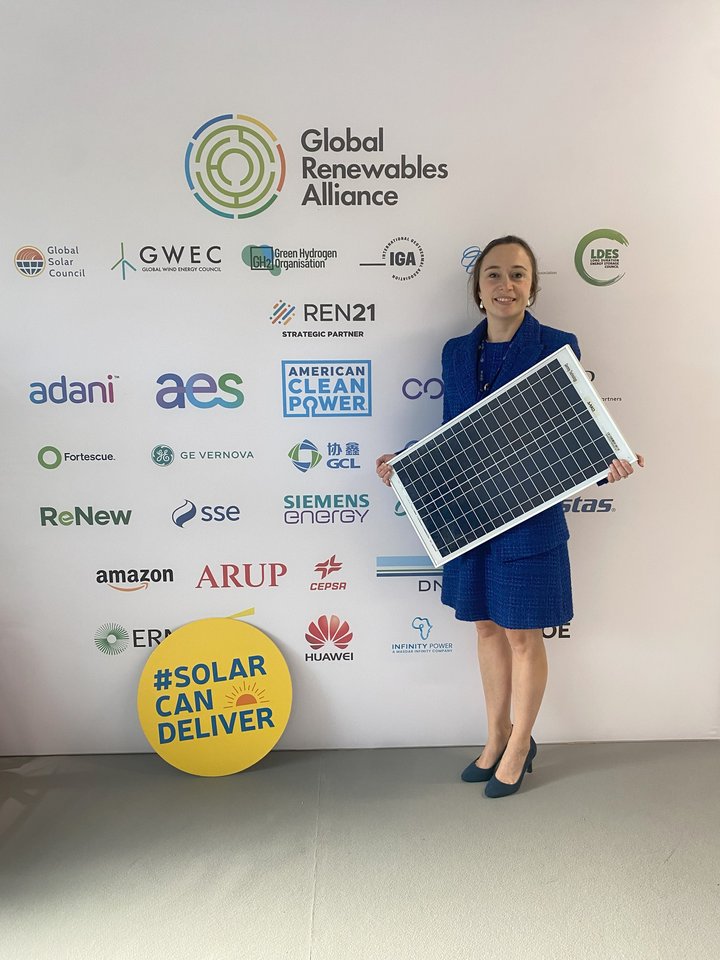Press Release
GSC CEO Statement on COP28 Tripling Renewables Pledge

Achieving consensus from over 100 countries to significantly step-up renewables ambition sends an unprecedented market signal that solar and wind are unstoppable. Over the past decade, the renewables industry has been striving to scale-up ambition at the country level, but achieving consensus from over 100 countries to significantly step-up ambition and set a target, on the global level, is unprecedented, and a big win for the energy transition. This is a big day in the history of renewables.
But this is just the first step in a longer journey. An ambitious pledge is even more powerful if it is backed by legally binding actions and accountability. We urge world leaders to not think that their job is done because they signed the pledge, but take the next step and include a global target to triple renewable energy capacity in the final COP documents so that we are sure countries take it seriously.
As the fastest to deploy, fastest growing, most cost-competitive and scalable renewable energy source, solar power will be the most important technology to drive the energy transition. Solar will need to make up over half of the 11 TW targeted in the pledge and delivering clean energy to a wide range of countries and communities. Leading analysts forecast that solar can easily deliver this capacity maintaining an average year-on-year growth rate of 17% - which is the same growth rate we’ve seen over the past decade, and actually most forecasts show a much higher growth rate.
But we can and want to deliver more. We want to deliver more utility-scale projects, we want to deliver more rooftop solar to power homes, hospitals and businesses, and we want to deliver all the benefits that come with this. That is our mantra here at COP – solar can deliver. And above all, we can deliver on 1.5C.
With the right enablers in place, solar alone can deliver nearly 8 TW of clean energy capacity by 2030, which is more than double the current installed energy capacity of China and the US combined. This means that the most effective action world leaders can take in Dubai to decarbonize and keep the world on a 1.5°C pathway is to pave the way to scale-up more solar this decade.
It’s simple - the faster countries scale-up solar, the better chance they have of bringing energy bills down and avoiding the worst impacts of climate change and improving the lives of their citizens now and in the future. If they limit solar’s potential, they could be depriving their citizens of jobs, energy access to catalyze economic development, energy security, affordable and reliable electricity, health access and more.
Solar can deliver a 1.5°C world. Solar is the reason why 1.5C is still just within reach – or a big part of it anyway. Ambition is the first step towards this with the new pledge, but now we need action and accountability so that solar will deliver now and many years to come. The sun comes up and goes down reliably every day of the year, all around the world – let's harness its power and build a new, cleaner energy system around it.
About the Global Solar Council
The Global Solar Council (https://www.globalsolarcouncil.org) is the voice of the world’s solar energy industry, a non-profit body based in Washington D.C. representing national, regional and international associations as well as leading solar sector corporations. Founded at the 2015 Paris climate conference as a private-sector response to the climate emergency, the Global Solar Council brings together associations from both established and emerging markets that represent companies all along the solar supply chain.
Contact
Alyssa Pek
Strategy and Communications Director, GSC
+32 490 56 81 39 (WhatsApp only)
![Global Solar Council [logo]](/static/images/gsc-logo-horizontal.svg)